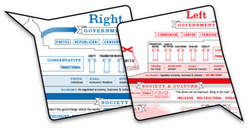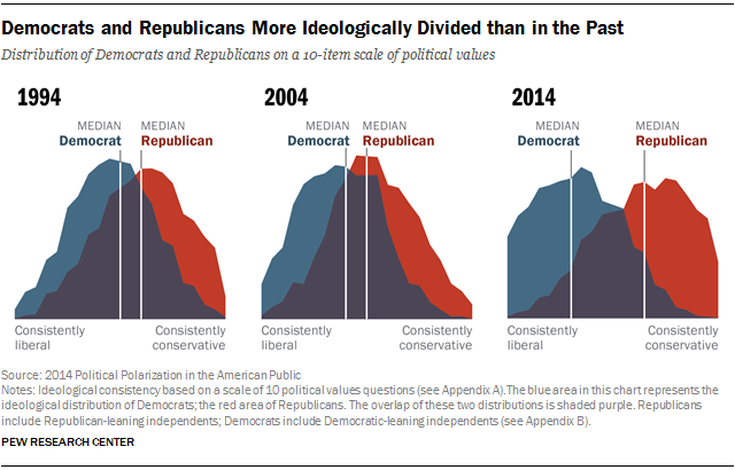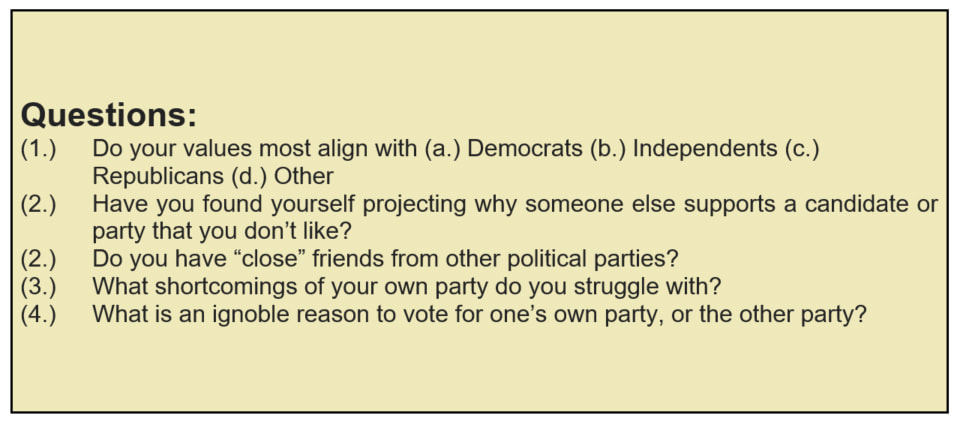Paul HopkinsDirector of Social Media + Big Data, North American Division Part 2 in our series on "Politics, Race & Religion." Read the following statements about the past two elections.
What do you think? Your answers will likely come from a bevy of factors, which will include ethnic origin, socio-economic background, geographic locale, upbringing and political persuasion. On top of this, neuroscientists say that biology may play a part in the structural differences within the brains and identities of Democrats and Republicans. Our political biases, predispositions, and values are tied into a part of the cortex that rewards us for defending our own political perspectives and resisting ideas that do not jibe with our views or lifestyles. (#3) So depending on your affiliations, your leanings and some science… the reasons people voted for these parties, or opinions about why others voted for those parties will vary greatly. That’s not unusual. However, it is troubling that the most consistently conservative and liberal bases are quickly sliding apart, signaling a shift toward a more drastic view of those who don’t look and/or think like you do. The middle has lost ground, and the most extreme ideological groups within both parties are shifting even further along the fringes of those floating bases.  This would work for any of the responses, but let’s select one listed above from Republicans and one from Democrats regarding why they voted for a particular candidate or party in 2012 and 2017. Some Republicans said, “I felt that the Democratic party focused on issues that aren’t relevant.” If you are a Democrat, I’d like you to think for just a moment what that means to you. Some Democrats said they voted the way they did because, “He (Obama) embodies my hopes, dreams and aspirations.” As a Republican, what does that mean to you? When people know that you are tracking their responses, their words become measured. Their emotions and deeper feelings about an issue are masked to protect themselves from criticism and something that disrupts their stability and balance. So for this part, I’ve asked several people I know about those statements. But as open and honest as I know many of them to be, they, like you or I, still might hold back. I asked the Democrats what they thought about the Republican response of “I felt that the Democratic party focused on issues that aren’t relevant.” But rather than waiting for their responses, I offered my own: “You know, important issues like inbreeding,” followed by “Like keeping White hope alive since 1776!” or “Like keeping Mexican food inside the border…at least the food part.” The responses? Smiles, light laughter, some nods. I asked the Republicans what they thought about the Democratic response of “He (Obama) embodies my hopes, dreams and aspirations.” And again, rather than waiting for responses, I said, “You know, aspirations like collecting a bigger welfare check to cover their luxury car payments?” followed by “Like being tolerant unless someone disagrees with them.” Or, “Like dressing up as a Democrat for Halloween and forcing people to hand over candy.” Same responsive cues. When I made the same digs about their political parties that I’d shared with the other group, the laughter was less robust, or muted. Even a few icy stares. (We’re all still friends…). I did this because I wasn’t chasing canned responses, but wanted a gut-check reaction to see if I could tap into the worst fears and thoughts we have about others. Laughter is harder to mask than thoughtful insight…because it’s instant. And I don’t think it’s because any of those people (White, Black, Hispanic and Asian) are bad…it’s because we’re human. It’s because the worse you appear and the lower I can depict you, the better I seem. It’s easy to demonize people who don’t look or think like we do. To reduce others to caricatures of laziness or racism. Of sexist xenophobes or entitled race baiters. If one wants to find the bad in people, one can, and one will. It’s convenient to think of ourselves and our views as forward thinking, noble and above moral scrutiny. The Bible says otherwise. “Do not take to heart everything people say, lest you hear your servant cursing you. For many times, also, your own heart has known that even you have cursed others.” Ecclesiastes 7:21-22 The apostle Paul wrote, “For I know that in me (that is, in my flesh) nothing good dwells; for to will is present with me, but how to perform what is good I do not find.” Romans 7:18 You remember those two original statements… “93% of African-Americans supported Obama in the first election, and 81% of conservatives voted for Trump in the second.” The statements were facts about voter actions, and that’s all that we can and should gather from them without additional information. And people’s reasons for voting for people or parties? The answers are thoughtful when we see them as complete sentences. Republican: “I felt that the Democratic party focused on issues that aren’t relevant. Homosexuality in our town, or immigration…frankly aren’t important to the people I know. The industries that fuel this region have left or are being shut down. I worry about putting food on the table. Those other things have nothing to do with where I live.” Democrat: “He embodies my hopes, dreams and aspirations. It’s nice to see someone that looks like me leading the nation. His election says to my children that you can be anything that you want to be despite what anyone else says or thinks. And on those days that I don’t think I can do it, he also reminds me that I can.” Neither of these statements were anything more than statements. But some prefer the shorter sentences without the context because soundbites leave room for assumptions and justifications of fear and/or hatred. One speaks to the realities of people’s lives, and the other to their hopes for the future. And if I put myself in their places, who am I to disagree. Survival and hope are values on which every racial group and political party can agree. They are American values. But that phrase itself is loaded because what are those values that define our country? 5/4/2023 03:02:18 am
What an interesting post. I enjoy reading this one! Comments are closed.
|
Archives
August 2020
Categories
All
|
- Home
- BLOG
-
RESOURCES
-
RESOURCE MENU
>
- ADVENTIST IDENTITY GUIDELINES
- BIG DATA RESOURCES
- BRANDING, IMAGE & DESIGN RESOURCES
- CHURCH/MINISTRY SPECIFIC RESOURCES
- COPYRIGHT & TRADEMARK BASICS
- COURSES
- EMAIL RESOURCES
- GUIDANCE FOR HIRING SOCIAL MEDIA POSITIONS
- PODCASTS
- REPORTS & CASE STUDIES
- SOCIAL MEDIA RESOURCES
- (SOCIAL) VIDEO RESOURCES >
- TEXTING 4 CHURCHES
- TRACKING & ANALTYICS
- WATCH VIDEOS & TUTORIALS
- WEBSITE TIPS
- SOCIAL MEDIA GUIDELINES
-
RESOURCE MENU
>
- SEO
- Digital Discipleship & Evangelism
- COVID-19 RESOURCES
- eNEWSLETTER



 RSS Feed
RSS Feed